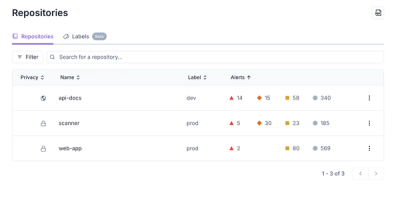
Product
Redesigned Repositories Page: A Faster Way to Prioritize Security Risk
Our redesigned Repositories page adds alert severity, filtering, and tabs for faster triage and clearer insights across all your projects.
electron-shared-state
Advanced tools
❤️ easily sharing state across electron main and renderer processes.


Sharing state between main and renderer process can be this easy.

npm install electron-shared-state
or
yarn add electron-shared-state
You can check source code under example directory.
// shared
export const initialState = 0;
// renderer
import { createSharedStore } from 'electron-shared-state';
const sharedStore = createSharedStore(initialState);
sharedStore.subscribe((state) => {
console.log(state);
});
setTimeout(() => {
sharedStore.setState((state) => {
state = state + 1;
});
}, 2000);
// main
import { createSharedStore } from 'electron-shared-state';
const sharedStore = createSharedStore(initialState);
sharedStore.subscribe((state) => {
console.log(state);
});
// both main and renderer will print the state after two seconds.
If your project already using state management tools like redux, you can easily replace a slice of your state with electron-shared-state, so you can just share part of the state you want to share without create a whole state tree in both processes.
// renderer
const sharedStore = createSharedStore(initialState);
// split state into a reducer
function sharedReducer(state, action) {
switch (action.type) {
case 'some action type':
const nextState = sharedStore.setState(...);
return nextState;
}
}
// combine with other reducer
const rootReducer = combindReducers({
other: ...,
shared: sharedReducer,
...
});
// create redux store
const store = createStore(rootReducer)
// in main process
// only this part of state will be shared across main and renderer
export const store = createSharedStore(initialState);
electron-shared-state only provides one simple function: createSharedStore. The signature is like below:
interface Options {
name?: string;
}
function createSharedStore<T>(
state: T,
options?: Options
): {
setState: (recipe: (draft: T) => void, description?: string | undefined) => T;
getState: () => T;
subscribe: (
listener: (state: T, description?: string | undefined) => void
) => () => void;
};
The input is the state your want to share across processes, generally it's an object.
It also accepts an optional Option object, you can pass a store name if you want to have multiple stores.
const s1 = createSharedStore(..., { name: 's1' })
const s2 = createSharedStore(..., { name: 's2' })
It returns a Store object with a few methods on it.
setState(stateUpdater, description)
Accepts a stateUpdater function and a description string for debug purpose. The stateUpdater is like the second argument of immer's produce, so it inherits immer's pitfalls.
Returns the new state. It use immer underneath so the state remains immutable, to keep it in sync across processes, you should always use setState to update it.
getState()
Returns the current state.
subscribe(listener)
Adds a change listener. It will be called any time the state is changed, the listener receives the latest state and a description string as arguments.
FAQs
Did you know?

Socket for GitHub automatically highlights issues in each pull request and monitors the health of all your open source dependencies. Discover the contents of your packages and block harmful activity before you install or update your dependencies.

Product
Our redesigned Repositories page adds alert severity, filtering, and tabs for faster triage and clearer insights across all your projects.

Security News
Multiple deserialization flaws in PyTorch Lightning could allow remote code execution when loading untrusted model files, affecting versions up to 2.4.0.

Security News
NVD now marks all pre-2018 CVEs as "Deferred," signaling it will no longer enrich older vulnerabilities, further eroding trust in its data.